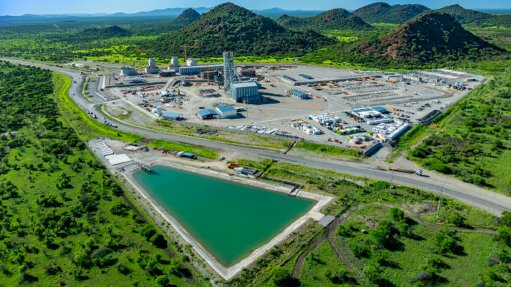Nature’s fury
The Covid-19 pandemic has hogged news headlines during the past couple of months, and understandably so. The upshot has been that other crises have received comparatively little attention from the media. A case in point is the scourge of climate change, which some say will cause a ‘climate apartheid’, where the rich will pay to escape or mitigate its effects while the rest of the world suffers.
I doubt if many South Africans know about the devastating flash floods that hit Kenya on April 20, killing scores of people as homes and markets were swept away. The disaster occurred in the same region where a landslide killed dozens of Kenyans about five months ago. On the other hand, as news concerning Covid-19 has become the media’s flavour of the month, one can bet one’s bottom rand that a fair number of South Africans are aware that Kenya’s President, Uhuru Kenyatta, is one of those African leaders who have – at least until now – resisted calls for a complete shutdown of economic activity to curb the spread of the deadly pandemic.
But climate change remains a major crisis, and the African continent will be the hardest hit, as hundreds of millions of its people depend on rainfall – which will become increasingly scarce as weather patterns become more volatile – to grow food crops. This is according to Oxford University climate science professor Richard Washington, who points out that the continent’s capacity for adaptation to climate change is limited, as poverty, which is rife on the continent, equates to little choice at the individual level, while governments generally fail to prioritise and act on climate change.
Should the planet continue to warm at current rates, the average global temperature could increase by 1.5 ºC over the next ten years, according to World Meteorological Organisation (WMO) predictions. This will worsen extreme weather events like the flash floods experienced in Kenya last month and the tropical cyclones that lashed Malawi, Mozambique and Zimbabwe in 2019, leaving in their wake massive loss of limb and life and large-scale infrastructure destruction.
As WMO secretary-general Petteri Taalas points out, while the health and economic impacts associated with Covid-19 will be devastating, they will last only a few years. The magnitude of climate change impacts will be much greater and will be longer-lasting. “If we are unable to mitigate climate change, we will see persistent health problems, especially hunger and the inability to feed the growing population of the world, and there will also be more aggressive impacts on economies,” Taalas warns.
A key lesson from how the world has responded to the Covid-19 pandemic is that it is possible to mobilise huge sums of money within a short space of time to confront a common challenge and to coordinate our efforts. Indeed, as Taalas says, “we need to flatten both the [Covid-19] pandemic and climate change curves, and we need to show the same determination and unity against climate change as against Covid-19”. He stresses that action needs to be taken not only in the short term but also for many generations ahead.
That urgent action should be taken to avoid nature’s fury becomes apparent when one considers the rate at which our planet is warming. The average global land and ocean surface temperature from January to March was 1.5 ºC above the average since 1880 and predictions were that 2020 would be one of the hottest years on record. But then Covid-19 struck, forcing national lockdowns of aviation, industry and energy generation, which resulted in a 6% decline in greenhouse-gas emissions, according to a WMO statement released in April.
But this good news will surely be short lived. One day, Covid-19 will be over, and economic activity will have to ramp up to full throttle. Thus, those who lead us must heed the call to flatten the climate change curve.
Article Enquiry
Email Article
Save Article
Feedback
To advertise email advertising@creamermedia.co.za or click here
Press Office
Announcements
What's On
Subscribe to improve your user experience...
Option 1 (equivalent of R125 a month):
Receive a weekly copy of Creamer Media's Engineering News & Mining Weekly magazine
(print copy for those in South Africa and e-magazine for those outside of South Africa)
Receive daily email newsletters
Access to full search results
Access archive of magazine back copies
Access to Projects in Progress
Access to ONE Research Report of your choice in PDF format
Option 2 (equivalent of R375 a month):
All benefits from Option 1
PLUS
Access to Creamer Media's Research Channel Africa for ALL Research Reports, in PDF format, on various industrial and mining sectors
including Electricity; Water; Energy Transition; Hydrogen; Roads, Rail and Ports; Coal; Gold; Platinum; Battery Metals; etc.
Already a subscriber?
Forgotten your password?
Receive weekly copy of Creamer Media's Engineering News & Mining Weekly magazine (print copy for those in South Africa and e-magazine for those outside of South Africa)
➕
Recieve daily email newsletters
➕
Access to full search results
➕
Access archive of magazine back copies
➕
Access to Projects in Progress
➕
Access to ONE Research Report of your choice in PDF format
RESEARCH CHANNEL AFRICA
R4500 (equivalent of R375 a month)
SUBSCRIBEAll benefits from Option 1
➕
Access to Creamer Media's Research Channel Africa for ALL Research Reports on various industrial and mining sectors, in PDF format, including on:
Electricity
➕
Water
➕
Energy Transition
➕
Hydrogen
➕
Roads, Rail and Ports
➕
Coal
➕
Gold
➕
Platinum
➕
Battery Metals
➕
etc.
Receive all benefits from Option 1 or Option 2 delivered to numerous people at your company
➕
Multiple User names and Passwords for simultaneous log-ins
➕
Intranet integration access to all in your organisation

















